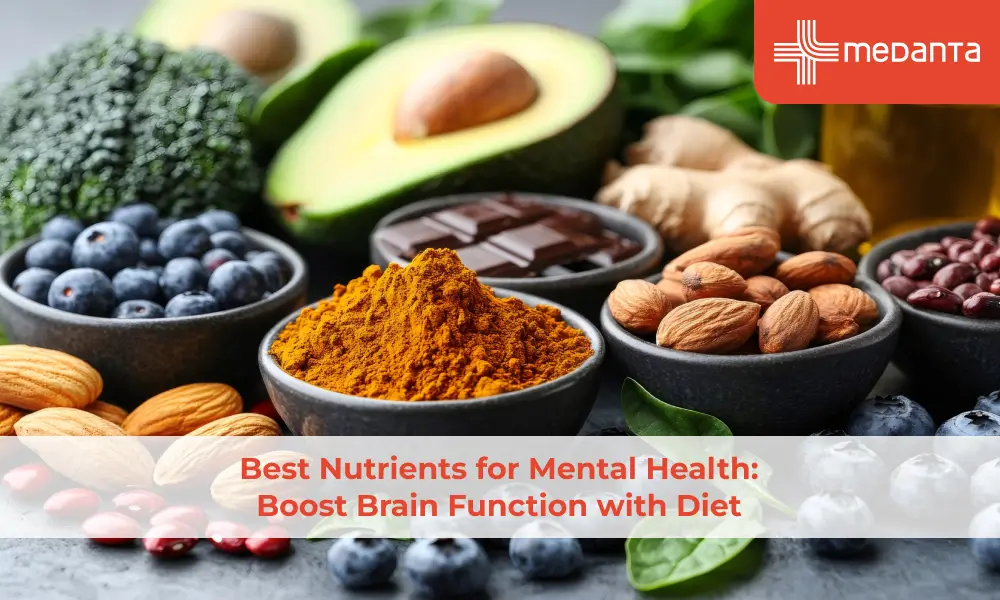Best Nutrients for Mental Health: Boost Brain Function with Diet

TABLE OF CONTENTS
We all know the benefits of a balanced diet for our physical health, but did you know it plays a vital role in mental health too? To boost mental health, focus on incorporating fresh fruits and vegetables, whole grains, healthy fats, and foods rich in omega-3 fatty acids. Traditional Indian ingredients like lentils, ghee, and turmeric can also significantly enhance brain health.
Tips for Healthy Eating
Limit processed snacks like packaged chips and sugary foods such as mithai and soft drinks. These can lead to energy fluctuations and reduce focus.
Include healthy fats like mustard oil, ghee, and coconut oil, which can improve brain function.
Opt for nutritious snacks like roasted chana, dry fruits, boiled eggs, or sweet potatoes. These provide sustained energy.
Plan your grocery list in advance and include wholesome ingredients. Avoid shopping when hungry to prevent unhealthy impulse buys.
Create mindful eating habits: avoid distractions like TV while eating, chew slowly, and savour your food.
Prioritize foods that promote both mental and physical health while watching your calorie intake.

Foods That Boost Mental Health
Fatty Fish Alternatives: Indian Options: While fish like salmon and mackerel are excellent sources of omega-3 fatty acids, Indian varieties such as rohu and hilsa are equally beneficial. These healthy fats support brain function and may reduce symptoms of depression.
Lentils and Legumes: Staples like moong dal, masoor dal, and rajma are rich in protein and folate, essential for brain health. Folate helps improve mood and cognitive abilities, reducing the risk of mental health issues.
Leafy Greens: Spinach (palak), fenugreek (methi), and amaranth (chaulai) are excellent sources of folate. These greens help combat depression, improve sleep quality, and reduce the risk of cognitive decline.
Nuts and Seeds: Indian nuts like cashews, almonds (badam), and walnuts (akhrot) are rich in magnesium and omega-3 fatty acids. Seeds such as flaxseeds (alsi) and chia seeds can further enhance brain health by boosting dopamine levels, improving memory, and alleviating stress.
Turmeric: Turmeric (haldi), a staple in Indian cooking, contains curcumin, which has anti-inflammatory and antioxidant properties. Curcumin has been linked to better mood regulation and protection against depression. Adding a pinch of turmeric to milk (haldi doodh) is an age-old remedy for mental and physical well-being.
Whole Grains: Indian whole grains like jowar, bajra, and ragi provide complex carbohydrates. These grains release glucose slowly, ensuring a steady energy supply to the brain and reducing mood swings.
Yogurt (Dahi): Curd and other fermented dairy products are rich in probiotics, which help maintain gut health and reduce anxiety. They also contain magnesium and potassium, promoting better brain function.
Avocados and Alternatives: While avocados are not commonly used in India, bananas and mangoes can serve as excellent substitutes. They provide essential vitamins and minerals that support brain health and improve focus.
Tomatoes (Tamatar): Tomatoes, widely used in Indian cooking, are rich in lycopene, an antioxidant that protects brain cells from damage. Regular consumption can help delay the progression of cognitive decline.
Dark Chocolate: Dark chocolate with at least 70% cocoa can enhance mood, focus, and memory. For an Indian twist, enjoy dark chocolate with roasted nuts or as part of a homemade trail mix.
Spices and Herbs: Indian spices like cinnamon (dalchini), cloves (laung), and saffron (kesar) have been shown to improve mood and reduce stress. Use them generously in curries, teas, and desserts for added mental health benefits.
Conclusion
Maintaining a balanced diet is essential not only for physical health but also for mental well-being. Incorporating nutrient-dense foods like fatty fish, lentils, leafy greens, nuts, and seeds, along with traditional Indian ingredients such as turmeric and ghee, can provide significant benefits for brain health. The connection between food and mental health is becoming increasingly evident, with evidence suggesting that these foods can reduce symptoms of anxiety, depression, and cognitive decline. By making mindful choices, avoiding processed foods, and focusing on wholesome, nutrient-rich options, we can improve both our mental and physical health, leading to a more balanced and fulfilling life.






